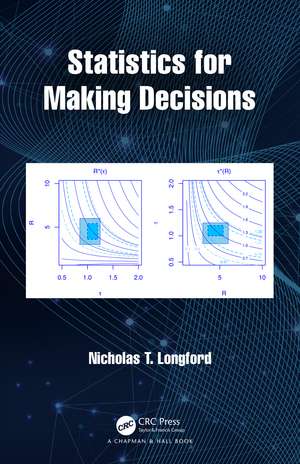Statistics for Making Decisions
Autor Nicholas T. Longforden Limba Engleză Paperback – 26 sep 2022
The volume appeals to the analyst who deals with the simplest statistical problems of comparing two samples (which one has a greater mean or variance), or deciding whether a parameter is positive or negative. It combines highlighting the deficiencies of hypothesis testing with promoting a principled solution based on the idea of a currency for error, of which we want to spend as little as possible. This is implemented by selecting the option for which the expected loss is smallest (the Bayes rule).
The price to pay is the need for a more detailed description of the options, and eliciting and quantifying the consequences (ramifications) of the errors. This is what our clients do informally and often inexpertly after receiving outputs of the analysis in an established format, such as the verdict of a hypothesis test or an estimate and its standard error. As a scientific discipline and profession, statistics has a potential to do this much better and deliver to the client a more complete and more relevant product.
Nicholas T. Longford is a senior statistician at Imperial College, London, specialising in statistical methods for neonatal medicine. His interests include causal analysis of observational studies, decision theory, and the contest of modelling and design in data analysis. His longer-term appointments in the past include Educational Testing Service, Princeton, NJ, USA, de Montfort University, Leicester, England, and directorship of SNTL, a statistics research and consulting company. He is the author of over 100 journal articles and six other monographs on a variety of topics in applied statistics.
| Toate formatele și edițiile | Preț | Express |
|---|---|---|
| Paperback (1) | 420.36 lei 6-8 săpt. | |
| CRC Press – 26 sep 2022 | 420.36 lei 6-8 săpt. | |
| Hardback (1) | 835.59 lei 6-8 săpt. | |
| CRC Press – 3 mar 2021 | 835.59 lei 6-8 săpt. |
Preț: 420.36 lei
Nou
Puncte Express: 631
Preț estimativ în valută:
80.45€ • 87.35$ • 67.57£
80.45€ • 87.35$ • 67.57£
Carte tipărită la comandă
Livrare economică 22 aprilie-06 mai
Preluare comenzi: 021 569.72.76
Specificații
ISBN-13: 9780367342708
ISBN-10: 0367342707
Pagini: 307
Dimensiuni: 156 x 234 x 17 mm
Greutate: 0.44 kg
Ediția:1
Editura: CRC Press
Colecția Chapman and Hall/CRC
ISBN-10: 0367342707
Pagini: 307
Dimensiuni: 156 x 234 x 17 mm
Greutate: 0.44 kg
Ediția:1
Editura: CRC Press
Colecția Chapman and Hall/CRC
Cuprins
1 First steps. 2. Statistical paradigms. 3. Positive or negative? 4. Non-normally distributed estimators. 5. Small or large? 6. Study design. 7. Medical screening. 8. Many decisions. 9. Performance of institutions. 10. Clinical trials. 11. Model uncertainty. 12. Postscript.
Notă biografică
Nicholas T. Longford is a Senior Statistician at Imperial College, London, specialising in statistical methods for neonatal medicine. His interests include causal analysis of observational studies, decision theory, and the contest of modelling and design in data analysis. His longer-term appointments in the past include Educational Testing Service, Princeton, NJ, U.S.A., de Montfort University, Leicester, England, and directorship of SNTL, a statistics research and consulting company. He is the author of over 100 journal articles and six other monographs on a variety of topics in applied statistics.
Descriere
Making decisions is a ubiquitous mental activity in our private and professional or public lives. It entails choosing one course of action from an available shortlist of options. Statistics for Making Decisions places decision making at the centre of statistical inference, proposing its theory as a new paradigm for statistical practice.
